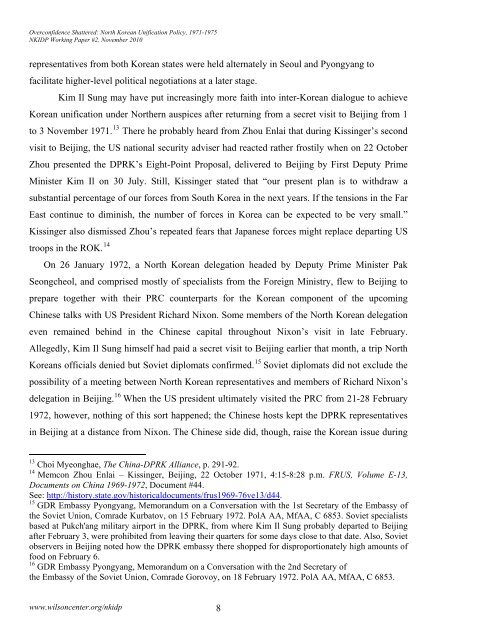Overconfidence Shattered: North Korean Unification Policy, 1971 ...
Overconfidence Shattered: North Korean Unification Policy, 1971 ...
Overconfidence Shattered: North Korean Unification Policy, 1971 ...
- No tags were found...
Create successful ePaper yourself
Turn your PDF publications into a flip-book with our unique Google optimized e-Paper software.
<strong>Overconfidence</strong> <strong>Shattered</strong>: <strong>North</strong> <strong>Korean</strong> <strong>Unification</strong> <strong>Policy</strong>, <strong>1971</strong>-1975NKIDP Working Paper #2, November 2010representatives from both <strong>Korean</strong> states were held alternately in Seoul and Pyongyang tofacilitate higher-level political negotiations at a later stage.Kim Il Sung may have put increasingly more faith into inter-<strong>Korean</strong> dialogue to achieve<strong>Korean</strong> unification under <strong>North</strong>ern auspices after returning from a secret visit to Beijing from 1to 3 November <strong>1971</strong>. 13 There he probably heard from Zhou Enlai that during Kissinger’s secondvisit to Beijing, the US national security adviser had reacted rather frostily when on 22 OctoberZhou presented the DPRK’s Eight-Point Proposal, delivered to Beijing by First Deputy PrimeMinister Kim Il on 30 July. Still, Kissinger stated that “our present plan is to withdraw asubstantial percentage of our forces from South Korea in the next years. If the tensions in the FarEast continue to diminish, the number of forces in Korea can be expected to be very small.”Kissinger also dismissed Zhou’s repeated fears that Japanese forces might replace departing UStroops in the ROK. 14On 26 January 1972, a <strong>North</strong> <strong>Korean</strong> delegation headed by Deputy Prime Minister PakSeongcheol, and comprised mostly of specialists from the Foreign Ministry, flew to Beijing toprepare together with their PRC counterparts for the <strong>Korean</strong> component of the upcomingChinese talks with US President Richard Nixon. Some members of the <strong>North</strong> <strong>Korean</strong> delegationeven remained behind in the Chinese capital throughout Nixon’s visit in late February.Allegedly, Kim Il Sung himself had paid a secret visit to Beijing earlier that month, a trip <strong>North</strong><strong>Korean</strong>s officials denied but Soviet diplomats confirmed. 15 Soviet diplomats did not exclude thepossibility of a meeting between <strong>North</strong> <strong>Korean</strong> representatives and members of Richard Nixon’sdelegation in Beijing. 16 When the US president ultimately visited the PRC from 21-28 February1972, however, nothing of this sort happened; the Chinese hosts kept the DPRK representativesin Beijing at a distance from Nixon. The Chinese side did, though, raise the <strong>Korean</strong> issue during13 Choi Myeonghae, The China-DPRK Alliance, p. 291-92.14 Memcon Zhou Enlai – Kissinger, Beijing, 22 October <strong>1971</strong>, 4:15-8:28 p.m. FRUS, Volume E-13,Documents on China 1969-1972, Document #44.See: http://history.state.gov/historicaldocuments/frus1969-76ve13/d44.15 GDR Embassy Pyongyang, Memorandum on a Conversation with the 1st Secretary of the Embassy ofthe Soviet Union, Comrade Kurbatov, on 15 February 1972. PolA AA, MfAA, C 6853. Soviet specialistsbased at Pukch'ang military airport in the DPRK, from where Kim Il Sung probably departed to Beijingafter February 3, were prohibited from leaving their quarters for some days close to that date. Also, Sovietobservers in Beijing noted how the DPRK embassy there shopped for disproportionately high amounts offood on February 6.16 GDR Embassy Pyongyang, Memorandum on a Conversation with the 2nd Secretary ofthe Embassy of the Soviet Union, Comrade Gorovoy, on 18 February 1972. PolA AA, MfAA, C 6853.www.wilsoncenter.org/nkidp 8
















